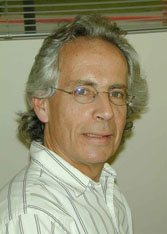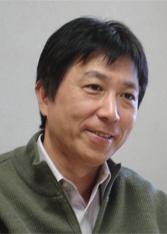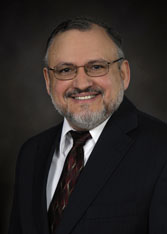Each day of the conference, we will feature a distinguished invited speaker in the 8–9am timeslot.
Monday
Prof. Stanley Osher (UCLA)

Stanley Osher received his Phd degree from New York University's Courant Institute of Mathematical Sciences. He is a Professor of Mathematics, Computer Science and Electrical Engineering at UCLA. He is also an Associate Director of the NSF funded Institute for Pure and Applied Mathematics. He is a member of the National Academy of Sciences, the American Academy of Arts and Sciences and is one of the top 25 most highly cited researchers in both mathematics and computer sciences. He has received numerous academic honors and has co-founded three successful companies, each based largely on his own (joint) research. His current interests mainly involve information science which includes graphics, image processing, compressed sensing and machine learning.
He has co-invented and/or co-developed the following widely used algorithms:
- Essentially nonoscillatory (ENO), weighted essentially nonoscillatory (WENO) and other shock capturing schemes for hyperbolic systems of conservation laws and their analogues for Hamilton-Jacobi equations.
- The level set method for capturing dynamic surface evolution
- Total variation and other partial differential based methods for image processing.
- Bregman iterative methods for L1 and related regularized problems which arrive in compressive sensing, matrix completion, imaging and elsewhere.
- Diffusion generated motion by mean curvature and other threshhold dynamics methods.
His website is http://www.math.ucla.edu/~sjo. His recent papers are on the UCLA Math Department CAM website: http://www.math.ucla.edu/applied/cam/index.shtml.
Tuesday
Prof. Rainald Löhner (GMU)

Rainald Löhner is the head of the CFD center at the department of computational and data sciences of George Mason University in Fairfax, VA, in the outskirts of Washington, D.C. He received a MSc in Mechanical Engineering from the Technische Universität at Braunschweig, Germany, as well as a PhD and DSc in Civil Engineering from the University College of Swansea, Wales, where he studied under Profs. Ken Morgan and Olgierd Zienkiewicz. His areas of interest include numerical methods, solvers, grid generation, parallel computing, visualization, pre-processing, fluid-structure interaction as well as shape and process optimization. His codes and methods have been applied in many fields, including aerodynamics of airplanes, cars and trains, hydrodynamics of ships, submarines and UAVs, shock-structure interaction, dispersion analysis in urban areas and haemodynamics of vascular diseases. He is the author of more than 650 articles covering the fields enumerated above, as well as a textbook on applied CFD techniques. His website is http://cds.gmu.edu/node/44
Wednesday
Prof. Kozo Fujii (ISAS/JAXA)

Dr. Kozo Fujii is a Professor in the Dept. of Aeronautics and Astronautics at the University of Tokyo, and the Deputy Director General of the Institute of Space and Astronautical Science (ISAS) at the Japan Aerospace Exploration Agency (JAXA). After finishing his Ph.D. in 1980 and spending several years at NASA Ames Research Center and the National Aerospace Laboratory (NAL), he returned to the ISAS in 1988. His current research interests are high-speed aerodynamics, high angle-of-attack aerodynamics, flow control and the Mars flyer.
Some of his CFD contributions include:
- The first successful vortex breakdown analysis of delta-type wings
- The first successful transonic flow simulations over a transport wing
- The development of algorithms for compressible flow simulations
- The design of the Shinkansen and Maglev trains
He has received many awards such as the Daniel & Florence Guggenheim Award from the International Council of the Aeronautical Sciences in 2004. He has been a fellow of the AIAA since 2004, and a regional editor of the “Notes on Numerical Fluid Mechanics” series and “Computers & Fluids” for many years. He gave a keynote speech at the ASME/JSME/KSME Fluid Engineering Conference and at the 4th Symposium on Hybrid RANS-LES Methods in 2011. His website is: http://flab.eng.isas.jaxa.jp/member/fujii/src/e/fujii2e.html. His work with ISAS/JAXA High-speed Aerodynamics Laboratory is at: http://flab.eng.isas.jaxa.jp/research/index_eng.html.
Thursday
Dr. Miguel Visbal (AFRL)

Dr. Miguel Visbal is Principal Research Aerospace Engineer and Team Leader of Multidisciplinary Computational Aerodynamics at the Air Vehicles Directorate, Air Force Research Laboratory. He has conducted and led research in the fields of unsteady separation, flow topology, vortex breakdown, flow control, and high-order methods for large-eddy-simulation. Dr. Visbal is an Air Force Research Laboratory Fellow and a recipient of the Air Force Basic Research Award for the development of high-resolution numerical methods for multi-physics simulations. He is the author or co-author of more than 250 technical publications. He is a Fellow of AIAA, an Associate Editor of the AIAA Journal, and has served as member of the Fluid Dynamics and Aero-acoustics Technical Committees. He also serves in the ASME Fluids Engineering Division Honors & Awards and CFD Technical Committees.
Friday
Prof. Spencer Sherwin (Imperial College)

Spencer Sherwin is a Professor of Computational Fluid Mechanics in the Department of Aeronautics at Imperial College London. He received his MSE and PhD from the Department of Mechanical and Aerospace Engineering Department at Princeton University. During his time at Imperial he has maintained a research program into the development and application of the high order spectral/hp element techniques with particular application to biomedical flow, separated unsteady aerodynamics and understanding flow physics through instability analysis. Professor Sherwin leads a successful research group focussing on the development and application of parallel spectral/hp element techniques for solving partial differential equations Spectral/hp Element method research group, Nektar++. His group has applied these techniques using direct numerical simulation and stability analysis to a range of applications including Biomedical Flows and separated Bluff Bodies and Vortex Flows of relevance to offshore engineering and vehicle aerodynamics. He has published over 100 peer-reviewed papers in International Journals covering topics from numerical analysis to fundamental fluid-mechanics and biomedical flow modeling and co-authored a highly cited book on the underlying spectral/hp element methods. Currently he is an associate director in the British Heart Foundation Centre of Excellence at Imperial and EPSRC/EADS funded Laminar Flow Control Centre.